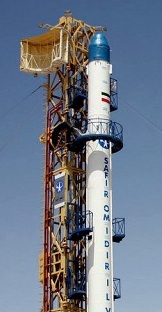Iran’s methodical march
Feb 21st, 2009 by MESH
From Mark T. Clark
 Iran is already posing new challenges to the Obama administration. Two recent developments in its nuclear and ballistic missile programs are worth mentioning.
Iran is already posing new challenges to the Obama administration. Two recent developments in its nuclear and ballistic missile programs are worth mentioning.
First, The International Atomic Energy Agency (IAEA) released a recent report on Iranian nuclear activities. The Institute for Science and International Security (ISIS), a Washington-based think tank, analyzed the IAEA report. Three important findings emerge:
- Iran has dramatically increased its installation of centrifuges to some 5,400;
- Iran is manufacturing fuel rods for the Arak heavy water reactor and continues to refuse IAEA inspection; and
- Iran has accumulated more than 1,000 kilograms of low enriched uranium (LEU) in the form of uranium hexafluoride (UF6).
Iran maintains some 4,000 centrifuges enriching uranium, but has added another 1,400 centrifuges, totaling some 5,400. Iran has yet to use the new centrifuges to enrich uranium, but could do so quickly. More importantly, Iran has produced about 209 kilograms (30 percent) more low-enriched uranium in the form of uranium hexafluoride (UF6) than would have been expected based on the November 2008 IAEA report. This amount equals approximately 700 kilograms of low-enriched uranium, enough for the production of weapon-grade uranium for a single nuclear weapon. As the ISIS report shows, Iran has achieved “breakout capability,” although it would have to make a decision to further enrich its LEU stockpile.
Second, on February 2, Iran successfully launched a small satellite into low-earth orbit. The satellite is very small, weighing approximately 27 kilograms or 60 pounds. The highly elliptical orbit of the satellite allowed it to pass over the United States a number of times transmitting radio signals. While some analysts downplayed the military significance of this achievement, there remains cause for concern for states outside the range of Iran’s Shahab series rockets. As noted in this report:
An intercontinental ballistic missile (ICBM) accelerates a warhead to velocities of approximately 7km/sec. By comparison, a space launch vehicle must accelerate a satellite to around 8km/sec. For a given payload, it would require more thrust to put an object into orbit than to deliver it over intercontinental distance, but it is slightly easier to put a very small object into low earth orbit than it is to accelerate a larger payload to a slightly lower velocity. The weight of the Iranian satellite (some 27kg) is considerably less than that of a nuclear warhead or other weapon of mass destruction. Iran therefore likely has some improvements to make before demonstrating true ICBM capability.
Iran continues methodically marching towards nuclear-armed missile capabilities that can threaten states in its region with nuclear weapons, and perhaps beyond. These events have occurred just as the Obama administration has made diplomatic overtures to the Iranian leadership. It seems that Iran may not give Obama time for diplomacy to work.
 Posts+Comments
Posts+Comments Posts+Comments
Posts+Comments Posts+Comments
Posts+Comments Posts+Comments
Posts+Comments